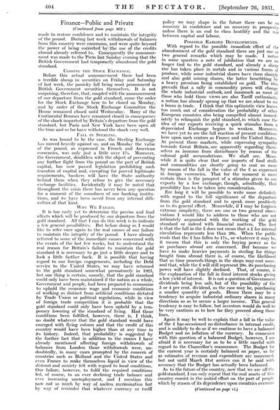POSSIBLE EARLIER DEVELOPMENTS.
With regard to the possible immediate effect of the abandonment of the gold standard there are just one or two general remarks which may be made, I notice in some quarters a note of jubilation that we are no longer tied to the gold standard, and already a sharp rise has taken place in metals and in various 'forms of produce, while some industrial shares have risen sharply and also gold mining shares, the latter benefitting by a heavy premium being established on gold. The idea prevails that a rally in commodity prices will change the whole industrial outlook, and inasmuch as most of those who hold those views are also Tariff enthusiasts, a notion has already sprung up that we are ;about to see a boom in trade. I think that this optimistic view leaves too much out of consideration the probability of other European countries also being compelled almost immed- iately to relinquish the gold standard, in which case the idea of our exports receiving a quick stimulus from a depreciated Exchange begins to weaken. Moreover, we have yet to see the full reaction of present conditions here upon such centres as France and the United States. At present those markets, while expressing sympathy towards Great Britain, are apparently regarding them- selves as immune from disturbance by reason of the colossal gold accumulations. We shall see. Mean- while it is quite clear that our imports of food stuffs and commodities are shortly going to cost us more by reason of the fall in the value of the £ as expressed in foreign currencies. That for the moment is more certain than is the prospect of a stimulus given to our exports by a low exchange, though, admittedly, that possibility has to be taken into consideration.
Ere long it will be possible to write more definitely with regard to the full significance of the departure from the gold standard and to speak more positively as to its general effect. Meanwhile, if I may be forgiven extreme simplicity, there are one or two general obser- vations I would like to address to those who are not intimately acquainted with the working of the gold standard or indeed with financial matters. The first is that the fall in the £ does not mean that a £ for internal circulation represents less than 20s. When the public reads that the £ has fallen to 17s., or whatever it may be, it means that this is only the buying power so far as purchases abroad are concerned. But because we have to make heavier payments in sterling for things bought from abroad there is, of course, the likelihood that as time proceeds things in the shops may cost more, and that, while the £ will still represent 20s. its purchasing power will have slightly declined. That, of course, is the explanation of the fall in fixed interest stocks giving a low yield of interest. It is not a question of Government dividends being less safe, but of the possibility of the 5 or 4 per cent. dividend, as the case may be, purchasing a smaller quantity of goods. Hence there may be a tendency to acquire industrial ordinary shares in many directions so as to secure a larger income. This general tendency is easy to follow, but investors would do well to be -very cautious as to how far. they proceed along those lines. _ Again it may be well to explain that a fall in the value of the £ has occasioned no disturbance in internal credit, and is unlikely to do so if we continue to have a balanced Budget 'and no inflation of the currency. In connexion with this question of a balanced Budget, however, I am afraid it is necessary for us to be a little careful with regard to the Chancellor's reassurance. The Budget for the' current year is' certainly balanced on paper, so far as estimates of revenue and expenditure are concerned, but not until March 31st arrives can it be said with accuracy that the Budget has actually been balanced. As to the future of the country, now, that we are off the gold standard, I can only repeat that the real assets of this country consist in the united effort on the part of people which by reason of its dependence upon countries overseas (Continued on page vi.)


































 Previous page
Previous page